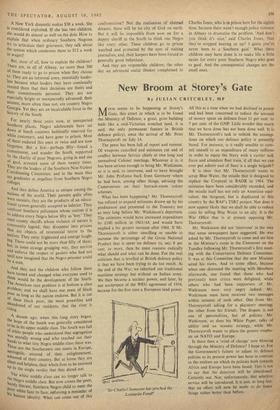All God's Children (I)
'All God's children got a race to run. . A song of the Albany Movement.
'I find it inexplicable. .
President Kennedy, wondering aloud why the City Commissioners of Albany, Georgia, cannot sit down and negotiate the grievances of their Negro citizens.
THERE is so much to explain. It cannot be done tidily, gracefully, with assurance, or with detachment. Perhaps it cannot be done at all. What the President thinks inexplicable happens to be less difficult to explain than almost any- thing else about Albany. Let us at least try what is truly difficult and without bottom.
One night in July, as has been their occasional practice for six months now, a group of Albany Negroes walked to its City Hall and knelt down upon the pavement outside and prayed aloud to God for justice and equality. In Albany by now, these ceremonies follow a ritual prescribed by custom. The police stand there looking down upon these protestants with expressions part puzzled, part embarrassed; after three minutes on his watch, Laurie Pritchett, their chief, says, 'All right now; you've made your point. Now will you move on or would you prefer to be arrested?'
The congregation stands, and sings one verse of 'We Will Overcome,' the benediction hymn of their movement, and is arrested all together. One of these nights, the chief confronted a de- monstrator no more than three feet tall.
'How old are you, son?' he asked. 'Nine,' the boy answered. 'What's your name?' 'Freedom F. Freedom,' the boy answered. Chief Pritchett put his band on this criminal's head. 'Go home, Freedom,' he said.
It must be understood, first of all, that the white South is at the unpredictable mercy of its coloured children, They arise one morning and
When we do achieve a classless soiirix, it certainly won't contain riff-rafi like you!'
decide that today is a day to go to prison and they go down to a restaurant in company and ask for service and are arrested. Albany has lost count of them, now; there are perhaps 200 of them, ranging in public stature from the Reverend Dr. Martin Luther King, the American Gandhi, to little boys vaguely remembered as Willie Something-or-other.
Albany's gaols are not as capacious as Georgia's reputation might seduce the imagina- tion and the prejudice of the alien observer into conceiving, and the city has been forced to com- mandeer cells from here to Waycross 140 miles away. The other day Willie C. Lovett, sixteen, got out of the gaol after a week. His mother had asked him to come out, and the Albany police were glad to see him go to make room.
promised the chief I wouldn't picket, so I Jay off for a week,' he said. He seemed to be speaking from a sense of honour. But Willie Lovett will be back in prison soon enough, be- cause he spends his days riding the farm counties trying to convince his elders to register and vote. Thiswas his seventh term in gaol. 'I think gaol's easier,' he observed. 'In gaol they just try to scare you. In communities they beat you up.'
He and his friends came home and stood in the light outside talking to the neighbours. A woman came up and laughed. 'Welcome home, gentle- men.'
Part of what must be explained is the pride the middle-aged Negro woman in Albany feels in her children, particularly the boys. The Negro male is peculiarly a menial in this culture. He is also a menial whose degradation is less in demand than it used to be, The Negro woman, as domestic, is more often than not the support of the family. The image of a Negro boy who will go to prison to assert himself a mart is 3 sudden, delightful surprise.
Roosevelt Matthews, who is just thirteen, 15 still in gaol in Americus. He was arrested three weeks ago as a protestant picket. The AlbanY police found his mother two weeks ago and told her that Roosevelt wanted to get out and could. be bailed for ten dollars. She was on the polnt of making his bond when she was struck bY mistrust.
'How do I know he wants to get out?' she wondered. 'If he did, there would have been 3 letter, or one of the boys who just got out of Americus would have brought me a message. 1 don't think it's fair to get a boy out of gaol if he don't want to come. He's strong; so long as, he gets a little something to eat, he'll be all right.
Annie Pearl Matthews had herself spent a week in prison as a protestant last December. 'The people Iv. ork for never even mentioned .1t. They paid me my $15 a week right along Will I was in gaol. The lady mentioned it the ars! Lime yesterday. She said she didn't understan. why 1 listened to Martin Luther King. I sald' "Miss Allison. you don't know how mean some of these white people are. You all are nice. Y" pay me $15 a week. But I got neighbours- %.0:1,°, work from seven to seven and get only Si
A New York domestic makes $50 a week. She IS considered exploited. If she has two children, she would do almost as well'on the dole. How to explain that when ordinary Southern Negroes try to articulate their grievance, they talk about the system which condemns them to $12 a week in wages?
But, most of all, how to explain the children? There are, in all of Albany. no more than 300 Of them ready to go to prison when they choose to. They are an informal army, essentially leader- less because what leaders they have continually remind them that their decisions are theirs and
their commitments personal. They are not especially bright or unexpectedly advanced; their accents, more often than not, are country Negro Georgia. yet they are an incalculable force in the history of the South.
For nearly three years now, at unexpected Southern places, Negro adolescents have sat down at lunch counters habitually reserved for White customers, and have gone to prison. Most Of them endured this once or twice and are now forgotten. But a few—perhaps fifty—found a commitment, and wander the South, supported by the charity of poor Negroes, going in and out of gaol, arrested some of them twenty times. They are the leaders of the Southern Non-Violent Coordinating Committee, and in the main they are graduates or expellees from Southern Negro colleges.
And they define America as unique among the nations of the world. Their parents quite often were menials; they are the products of an educa- tional system generally accepted as inferior. They confront Southern policemen whose custom it is to address every Negro below fifty as 'boy.' They meet county sheriffs whose violence of nature is cc`rnutunity legend; they disappear into prisons that are objects of reverential terror to the natives. They enter frightened and emerge laugh- ing. There could not be more than fifty of them; but, in some strange grudging way, they survive and enforce the respect of gaolers who had not until now imagined that the Negro prisoner could be a man.
And they and the children who follow them have turned and changed what everyone used to think would be the development of the South. ,... he American race problem is at bottom a class Problem; and we shall have our mass of black 'Tor as long as the nation endures. But it is out of these black poor, the most powerless and abandoned of our residents, that the river is rising, A decade ago, when this long story began. the hope of the South was generally considered to be in its upper middle class. The South was full °I white people who understood that segregation Was morally wrong and who reached out their h rds to what tiny Negro middle class there was. T nese are the Southerners one meets in Europe, af1,431bgetic, assured of their enlightenment. s7,"an-led of their country. But at home they are Up and helpless, their whole lives to be summed uP in the single verdict that they dared not. The white middle class can no longer talk to th b e Negro middle class. But now comes the poor. Poor literate, Southern Negro child to meet the kkj,sor white face to face, enforcing a reminder of ni human identity. What can come out of this
confrontation? Not the realisation of abstract dreams; there will be no city of God on earth. But it will be impossible from now on for a deputy sheriff in the South to think one Negro like every other. These children go to prison watched and protected by the eyes of visiting journalists, and, their keepers have been forced to generally good behaviour.
And they are responsible children; the other day an advanced social thinker complained to Charles Jones, who is in prison here for the eighth time, because there wasn't enough police violence in Albany to dramatise the problem. `And don't you think it's nice,' said Charles Jones, 'that they've stopped beating us up? I guess you've never been to a Southern gaol.' What these children may have done is to make life a little easier for every poor Southern Negro who goes to gaol. And the consequential changes are the small ones.































 Previous page
Previous page